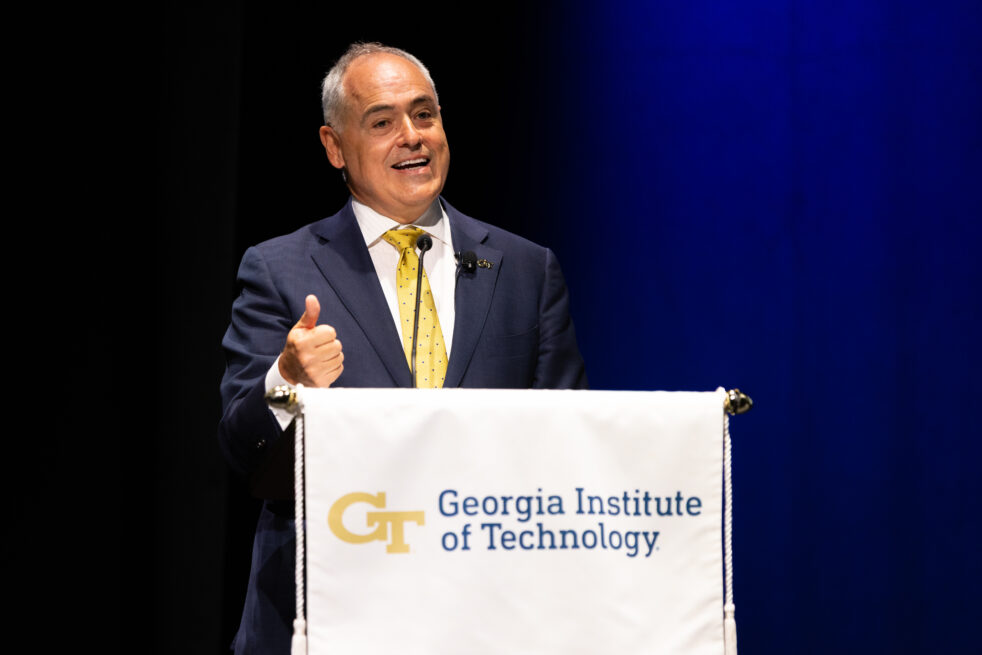On Thursday, Sept. 4, Tech President Ángel Cabrera delivered his seventh annual Institute Address at the Walter G. Ehmer Theater in the John Lewis Student Center. Here, Cabrera shared recent Institute achievements, as well as his current vision and goals for the upcoming academic year with faculty, staff and students.
In his opening address, Cabrera announced a record-breaking school year for the Institute. Student enrollment in both undergraduate and online master’s programs reached a record high of over 53,000 students, making it one of the fastest-growing public institutions in the nation over the past decade.
Research at the Institute achieved its highest revenue in history, totaling nearly $1.5 billion, with the Georgia Tech Research Institute (GTRI) sharing earnings of almost $1 billion in research awards.
Cabrera also took time to introduce nine new faculty and staff members, representing a variety of departments, including athletics, research and academics.
Undergraduate and graduate Student Government Association presidents Sultan Ziyad and Will Pavlick, as well as additional administrative faculty, were also recognized at this time.
“In short, we are getting the job done, and for that I thank each one of you and congratulate you,” Cabrera stated. “None of this, of course, would be possible without the talent and dedication of one of the best teams in American higher education.”
Delving further into his address, Cabrera reviewed the Institute’s nuanced strategic plan that he first announced just a year ago in his 2024 Institute Address.
This strategic plan comprises four central goals: leading the nation in outcomes and value for all students, doubling the annual number of degrees granted and non-degree learners, doubling the scale and impact of our research and building a national hub for creativity, innovation and entrepreneurship.
Known as the “big bets,” they represent a newly refreshed vision of the Institute’s strategic plan. First developed in 2020 during Cabrera’s initial introductions to the Institute, the project has now shifted as it approaches its halfway point in completion by 2030.
“It is quite unusual for universities to be that explicit in declaring their aspirations, but in the Yellow Jacket ‘We can do that’ spirit, that’s exactly what we did. Even though the goals are so aspirational, we are actually making significant progress on all of them,” Cabrera remarked. “Very importantly, our big bets do not concern our reputation or rankings, or what others think about us… The big bets are about what we do for others, what we do to have a bigger impact on the people that we serve.”
Cabrera cited a positive correlation between the career outcomes from a degree at Tech and its costs. He outlined that this is evident in the decreasing tuition costs over the past several years, the affordability of top graduate programs such as the Online M.S. CS (OMCS) or MBA and four-year graduates outperforming compared to the national average.
Degrees awarded at Tech reached a record number of 13,151, an upward trend at the Institute with a goal of 15,000. Speaking about the adoption of the College of Lifetime Learning, new degrees and new minors, Cabrera credits these additions as facilitators of higher enrollment. Doctoral and international student enrollment, however, saw a unique decrease, a shift that Cabrera stated was not solely observed at Tech.
Amidst recent federal funding cuts, Cabrera highlighted the perseverance of faculty and students in the face of uncertainty regarding subsidies and changing leadership. Aside from record revenue gained from Tech research, the Institute also saw a positive influx in grant funding, with 46 projects worth a combined total of $15 million cancelled, compared to faculty, who secured 10x more projects worth a combined $600 million.
Cabrera expressed the transformation of Tech into a hub for innovation and creativity, emphasizing his most anticipated projects. Here, Cabrera announced that the completion of both George and Scheller Towers is just months away, in addition to the conversion of the Biltmore into a new hub for entrepreneurship.
While Cabrera boasted a record-setting year in admissions, research and infrastructure development, his largest announcement came from a $100 million donation to the George W. Woodruff School of Mechanical Engineering.
Representing the largest donation in the Institute’s history, John Durstine, ME ‘57, agreed to transfer the entirety of his estate to the college after several years of private discussion. The donation will primarily be used to fund faculty, infrastructure and state-of-the-art resources for Tech’s oldest major.
“We’re going to set panels from all the living school chairs in ME, to talk about the history, the past, the present, the future. ME was not always at the top of the country. Now it is,” Cabrera told the Technique. “We’re going to have a whole series of things. And the Durstine name will go on lots of things. I mean, we’re so, so happy. And we’re going to make sure that that name really is honored as it deserves on this campus.”
To end his address, Cabrera participated in a short sit-down Q&A moderated by the Vice President of Institute Communications, Abbigail Tumpey.
During this time, Cabrera answered five questions submitted before the address from the crowd: how has Tech approached concerns of distrust within higher education; what has been done to support faculty members who have lost research funding and what safeguards are now in place; how is Tech balancing campus growth with campus capacity; what is Tech doing to support international students and faculty facing Visa issues; and what his thoughts were concerning return-to-office policies.
The Institute Address is an annual event hosted by the Institute president, available to all faculty, staff and students in person and online. Ángel Cabrera’s 2025 Institute Address can be found at https://.youtube.com/watch?v=vVGz29YrXBo.
